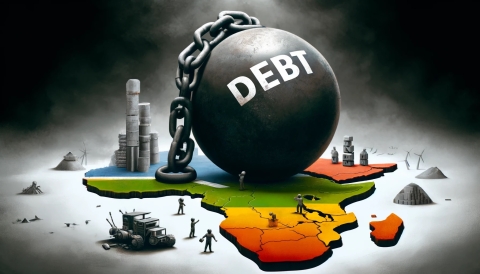
Legislation in the state of New York has the potential to ease the international sovereign debt crisis for countries around the world, including Kenya.
The following article was published in the July-August 2024 issue of NewsNotes.
The world is facing a historic global debt crisis driven by the Covid-19 pandemic, geopolitical conflicts and climate change. More than a third of the world’s countries are in or at risk of debt distress, with the UN estimating that some 3.3 billion people currently live in countries that spend more on debt servicing than on education or health.
No where is this more evident than in Kenya, where rioters protesting the president’s efforts to raise taxes on June 18, broke into Parliament in Nairobi, setting fire to a section of it before facing live fire from security forces which resulted in the deaths of at least 23 people and hundreds injured. The Kenya National Commission on Human Rights (KNCHR) reported that at least 39 deaths have occured in June relating to the protests country-wide.
Kenya spends 61 cents of every tax dollar on repaying its foreign debt, according to the BBC, straining the African country known for having the youngest population on Earth.
As a global financial center, New York State has a unique responsibility in this sovereign debt crisis. Its laws govern over half of international sovereign debt bonds and enable litigation by "vulture creditors" who refuse to participate in international debt restructuring in order to maximize profits at the expense of the well-being of billions of people.
In the past two decades almost half of sovereign defaults have been accompanied by litigation. This pushes indebted sovereigns further into financial distress, and into the arms of multilateral development banks. The banks offer loans – financed by the nation’s taxpayers – that are intended to be directed towards infrastructure, healthcare, education, and climate adaptation, but instead are diverted to making debt payments while litigation drags on.
In the recent session of New York’s State Legislature, three different bills were introduced in an effort to correct this situation and deter the abuse of vulture funds.
While the two stronger pieces of legislation did not pass, a third less ambitious bill, the Senate bill (S5623) aimed at curbing predatory hedge fund behavior did pass the New York Senate. Although it did not advance to the State Assembly, the Senate victory gave momentum to the movement. It is likely that supporters will regroup and present a stronger piece of legislation to the 2025 session.
The Executive Director of Jubilee USA Eric LeCompte said, “This legislation is a step in the right direction. The legislature will need to take more comprehensive action to deal with all of the negative ways that New York’s debt laws harm developing countries.”
Other activists were more skeptical. According to Ben Grossman-Cohen, Director of Campaigns for Oxfam America, wrote on the subject, “The new text of this sovereign debt bill makes modest progress that will benefit people facing dire poverty around the world, but ultimately offers only a band-aid where critical care is needed. Its passage may help stop vulture funds from the most egregious and indefensible abuse of New York’s laws, but leaves open the option for holdout creditors to use New York’s courts as leverage to put the screws to low- and middle-income countries by stripping out any obligation for creditors to participate in good faith to restructure unsustainable debts. … Legislators should pass this bill and continue their work to enact reforms such as the Sovereign Debt Stability Act to ensure that all private creditors governed under New York laws operate responsibly.”
A collation of supporters of the bill, including the New York State Council of Churches, Jubilee USA Network, Oxfam and Partners in Health, issued a statement saying the bill “represents progress in limiting some of the worst, predatory behavior of the ‘vulture hedge’ funds” but “it does not deal with the greater concern for New Yorkers and developing countries of dealing with bad faith actors and hold-out behavior.” The coalition expressed its disappointment over the removal of a good faith provision. “The removed language would have ensured that all private creditors would be required to cooperate in qualified restructurings in good faith.”“While we celebrate progress and this victory with the Senate passage, the coalition said, “New York legislators must continue their work to enact further comprehensive reforms such as those included in the Sovereign Debt Stability Act (S5542A/A2970) to ensure that all private creditors governed under New York laws operate responsibly.”
Faith in action
Read more about the Vatican’s focus of debt relief in the 2025 Jubilee year. https://mogc.info/jubilee2025
Graphic illustrating the burden of the debt on third world countries by DALL-E.
